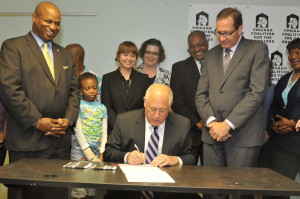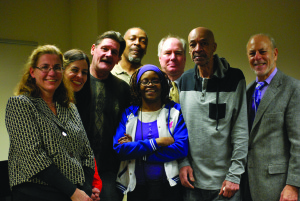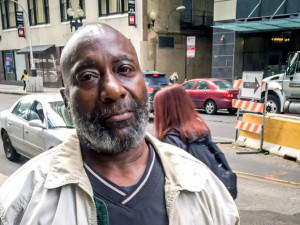The Law Project has increased its focus on defining and protecting the civil rights of people who live on the street. This work centers on litigation and advocacy for housing as an alternative to criminalization. The Law Project is active in “Housing Not Handcuffs,” a national campaign that aims to assist people in securing permanent housing while highlighting the expense, ineffectiveness, and harm caused by overpolicing.
The Illinois Bill of Rights for the Homeless Act

Chicago Coalition for the Homeless was instrumental in passing the Illinois Bill of Rights for the Homeless Act (HBOR) in 2013. Illinois was the second state in the nation to guarantee particular civil liberties to those experiencing homelessness. The Bill of Rights includes among other protections a right to be free from discrimination by state and municipal agencies. It also protects the right to privacy in one’s possessions to the same extent as in a private residence. Law Project attorneys have worked to implement the act, educating those who are impacted through advocacy, outreach, and litigation.
The bill was signed into law in the CCH office by then-Gov. Pat Quinn.
Bryant v. City of Chicago
The same year that HBOR was signed into law, CCH attorneys and legal interns began intensive outreach around “street sweeps” in Chicago – a regular practice where city workers would, without notice, confiscate and throw out the property of homeless people. Sweeps regularly occurred on Lower Wacker Drive and under the Wilson viaduct in the Uptown neighborhood, often early in the morning. Police and sanitation workers used the sweeps and threat of arrest as a method of dispersing and intimidating people living on the street.

CCH attorneys and pro bono partners drafted a complaint around these practices, asserting violations of HBOR as well as other state and federal laws. Our negotiations with the city of Chicago resulted in a settlement and new street cleaning policy enacted in January 2015 that includes heightened protections for homeless property.
The Law Project continues to monitor how the city implements this policy while educating the homeless community about its protections. During FY18, our legal staff and a street outreach worker connected with 256 people living on the street, monitoring issues impacting them and offering legal aid when needed.
Homeless Court
Stemming from the American Bar Association’s Commission on Homelessness & Poverty, the Law Project convened a work group in 2015 to explore starting a specialty “homeless court” in Chicago. The court opened in May 2017 at Branch 37 (Belmont & Western) as a diversion program for homeless people charged with minor crimes, helping them access services from Thresholds and Heartland Alliance. Collaborating on the court’s startup and implementation are all the Cook County agencies involved in courts and criminal justice.
Enacting the USICH Guidance in Uptown
The United States Interagency Council on Homelessness issued guidance in 2015 titled, “Ending Homelessness for People in Encampments: Advancing the Dialogue.” It calls for a “Housing First” approach to engage people living in encampments. The guidance emphasizes the need for a process that involves community stakeholders, including homeless people who reside there. It also calls for an end to practices that criminalize those who live outside, envisioning permanent housing as the solution instead of shelters or temporary fixes.
In the spring 2016, the Law Project attorneys used the USICH Guidance as a tool to begin the stakeholder process with people living in tents underneath the viaducts of Lake Shore Drive in Uptown. By involving the local alderman, the new commissioner of Chicago’s Department of Family and Support Services, and community agencies and leaders, CCH helped secure a city commitment for a pilot program that provided permanent housing to 75 individuals living under Uptown viaducts.
Henderson v. City of Chicago

In April 2016, the Law Project filed Henderson v. City of Chicago in Illinois state court, believed to be the first filed case that invokes protections under the Homeless Bill of Rights. Robert Henderson, then 62, was living under a viaduct on Chicago’s Near West Side in November 2015. Chicago Streets and Sanitation workers, without notice, threw away all his belongings. Lost were blankets and clothes, medications, obituaries of loved ones, and a Bible given to him by a minister to his family. City officials told Mr. Henderson to leave the viaduct when he confronted them about what happened.
Co-counseling with the Hughes Socol law firm, we represented Mr. Henderson when he sued the city for violating the Homeless Bill of Rights. Through Mr. Henderson’s case, the Law Project held the city accountable for its practice of disregarding the property rights of homeless people on the street. After two years, attorneys secured a February 2018 settlement that included monetary damages for Mr. Henderson. He now lives in a senior’s complex and volunteers with a soup kitchen.
Two other HBOR cases against the city of Chicago remain in litigation in 2018.
